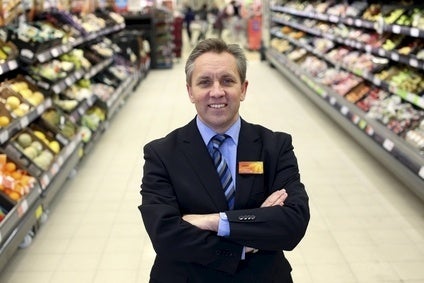
UK retailer Sainsbury’s has downplayed concerns over increased competition around price in the UK grocery sector. The supermarket group has insisted that a combination of its own label offering and “tough” supplier negotiations mean that it remains price competitive, while a broader definition of “value” enables it to extend its points of difference. Katy Askew reports.
The spotlight is shining firmly on price positioning in the UK grocery sector, with three of the country’s four largest supermarket operators lowering prices on everyday essentials and branded products.

Discover B2B Marketing That Performs
Combine business intelligence and editorial excellence to reach engaged professionals across 36 leading media platforms.
In recent months, the camps of Tesco, Morrisons and Asda have all issued announcements on blockbuster investments to slash prices in a bid to fend off competition from the growing discount sector. Asda and Tesco plan to invest around GBP200m (US$243.7m) in price positioning this year, while Morrisons intends to invest around GBP300m.
The rising competition around price can be seen in the latest food inflation figures, released this morning by Kantar Worldpanel. The research firm said that the UK grocery market grew at 1.9% in the 12 weeks to 27 April, its lowest level for 11 years. Kantar attributed the slowdown to “intensifying price competition” among the supermarkets.
Sainsbury’s alone has refused to enter the fray.
The second-largest supermarket group in the country has stood firm in its insistence on a broader definition of “value” that encompasses “values” such as ethical sourcing initiatives that have included the switch to cage-free eggs, sustainable tuna sourcing and the use of 100% British flour.

US Tariffs are shifting - will you react or anticipate?
Don’t let policy changes catch you off guard. Stay proactive with real-time data and expert analysis.
By GlobalDataTo an extent, this strategy seems to have paid off and the group booked an increase in full-year retail operating profit of around 5% this morning (7 May), beating consensus expectations. Retail sales in the period grew 2.7%, with like-for-like sales up 0.2% excluding fuel.
Nevertheless, Sainsbury’s share price slipped a little over 2% in morning trade. Investors have reacted to concerns that the group’s refusal to publicly commit to price cuts will see revenue come under growing pressure.
“Sainsbury’s continues to steer away from significant price cutting, against the backdrop of a discounting war among its big four rivals in response to continued incursions made by the discounters,” Conlumino analyst George Scott observed.
“The grocer is instead opting to stick to its knitting of helping customers Live Well for Less through an offer of ‘high quality, affordable own-brands’. While we believe progress in this area can provide Sainsbury’s with a more sustainable competitive advantage over time, it will undoubtedly face a more difficult trading period amid a stronger focus on price among its peers.”
Outgoing CEO Justin King has shrugged off these anxieties, insisting that price investments being made by competitors are more about “PR” and “sabre rattling” than a shift in the competitive landscape.
“We will respond to what people actually do. Our price position remains as competitive as ever,” he insisted in an analyst meeting to discuss the result.
Management said that Sainsbury’s offers “affordable quality” through its own label offering, while negotiations with suppliers have seen a shift in the way branded products are priced in its stores.
“We believe we deliver value for money in unique way. Central to that is own brand… it is the key way customers save money,” King said.
The chief executive claimed that Sainsbury’s brand products are between 20% and 40% cheaper than branded alternatives and Sainsbury’s has seen its own label sales grow at around twice the rate of branded revenues.
The company has, however, also worked to deliver value through the brands it carries, King added. “One of the journeys we have been on with value simplicity is to take out promotions and put it on cost of goods… The way we negotiate with suppliers is to make the choice very clear. There is a significant upside for those who come on that journey and not for those that don’t.”
King suggested that branded manufacturers have been forced to increase promotional levels due to unjustified increases in baseline prices that they have then had to “dial back” through special offers. More “far sighted” branded manufacturers have responded positively to pressure to adopt a less promotional stance, management suggested.
“We negotiate as hard with our suppliers as we have always done and we actively make choices about suppliers that we want to work with,” King added.
Consumers are given additional reassurance that Sainsbury’s products are competitively priced through the group’s Brand Match scheme which compares its branded prices against those of Tesco and Asda, the group continued.
While King conceded that the likes of Aldi and Lidl are gaining share in the UK grocery market, unlike the other major grocers he indicated that Sainsbury’s hopes to leverage the growth of the discount sector by focusing on Sainsbury’s points of difference.
“Of course it has increased because there are a lot more Aldi shops. If you look at the track of their business over the last five years they have been adding 20% to their estate… One thing we have worked on is how to make the net impact positive because there are lots of things we do well that they don’t.”
The opening of a new Aldi might draw more people to “our side of town”, King explained. As a result Sainsbury’s could lose some sales on products that the discounter is known for offering cheaply but by focusing on what Sainsbury’s does well the group can see a net benefit thanks to increased footfall to the area, he argued.
“We will win the future by being a better us not a poorer them.”





